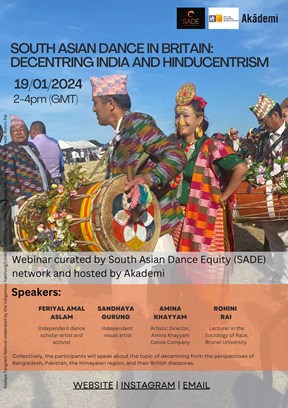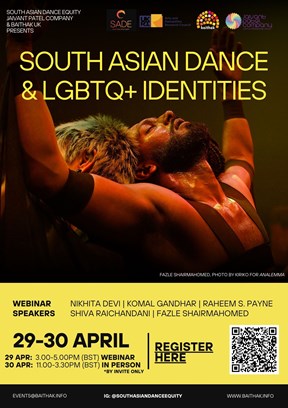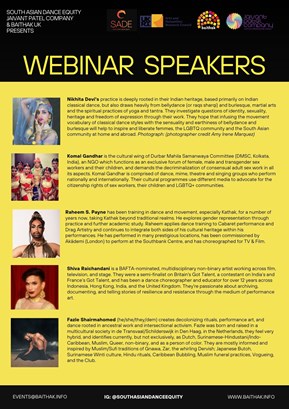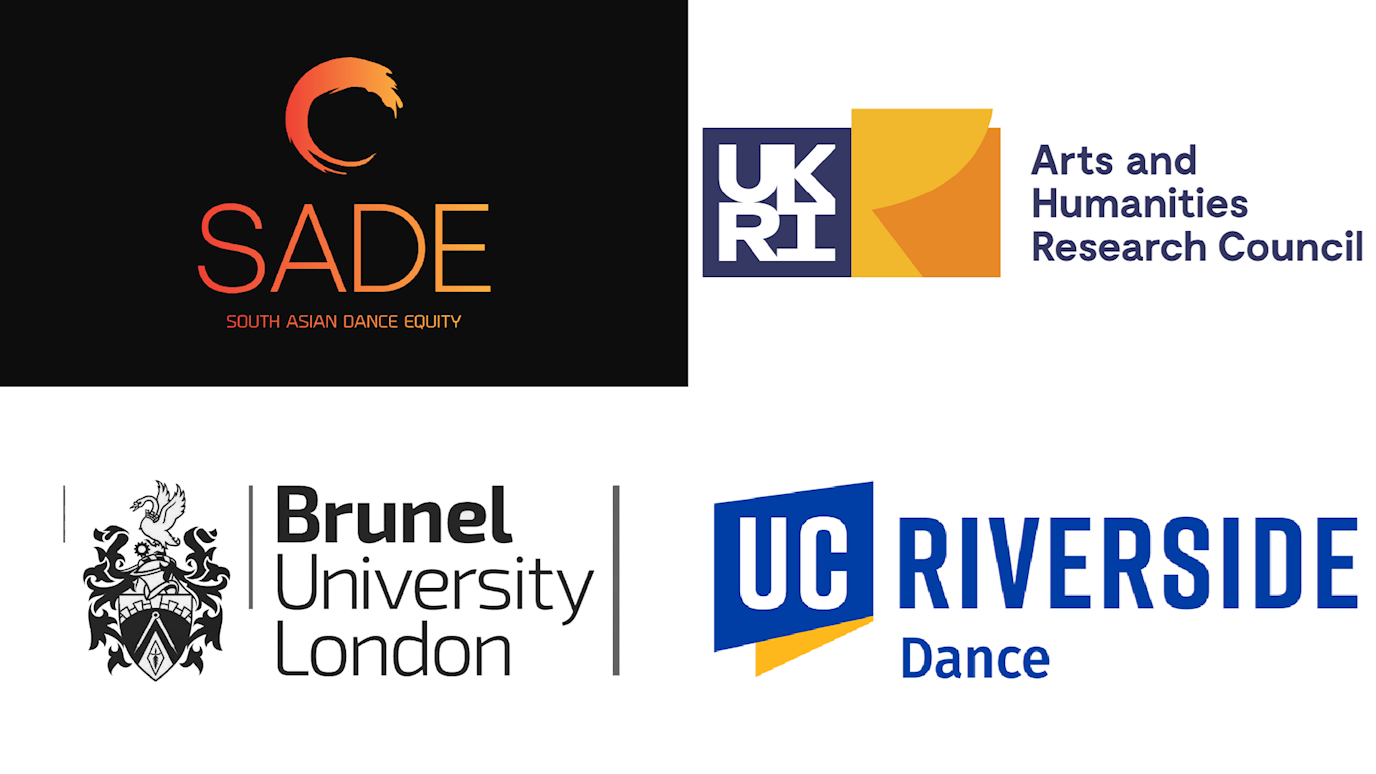The Arts That British South Asian Dance Ignores
South Asian Dance Equity (SADE): The Arts That British South Asian Dance Ignores (AH/Y002172/1, 2023-2025) is an Arts and Humanities Research Council funded Dance Research Matters network grant.
SADE will examine systemic inequities within British South Asian dance, focusing on five key areas of minoritisation: the dominance of Indian/Hindu dance forms and artists; LGBTQI+ artists; caste-oppressed artists; disabled artists; and folk and Adivasi (indigenous) arts and artists. Working with five British South Asian arts organisations (Akademi, Baithak UK, Balbir Singh Dance Company, Nupur Arts, and Sampad) and The Place Theatre as project partners, the network aims to build a more equitable dance sector through exchanges between artists and scholars from South Asia and the UK.
The network is led by Prarthana Purkayastha (Royal Holloway University of London), Royona Mitra (Brunel University London), and Anusha Kedhar (University of California, Riverside). British South Asian dance has historically tended to be the domain of dominant caste, class privileged, able-bodied, heterosexual and cis-gender women of Indian heritage. The three lead researchers are positioned within each of these categories. The network will also be guided by a Steering Committee comprised of our project partners (listed above) as well as Priyanka Basu (King’s College London, UK), Aishika Chakraborty (Jadavpur University, India), Durbar Mahila Samanwaya Committee and its cultural wing Komal Gandhar (India), Jaivant Patel (Jaivant Patel Company, Wolverhampton, UK), Brahma Prakash (Jawaharlal Nehru University, India), Huma Riaz Khan (The Rights Collective, UK), and Biju Topo of Akhra-Ranchi (India).
Project Research Team
Prarthana Purkayastha
Principal Investigator
Prarthana Purkayastha is Reader in Dance and Performance Studies at Royal Holloway University of London. She is the author of Indian Modern Dance, Feminism and Transnationalism (Palgrave Macmillan, 2014); The Archives and Afterlives of Nautch Dancers in India (Cambridge University Press, forthcoming); and Co-Editor (with Anurima Banerji) of the Oxford Handbook of Indian Dance (Oxford University Press, 2024).
Royona Mitra
Co-Investigator
Royona Mitra (Co-Investigator) is Professor of Dance and Performance Cultures at Brunel University London. She is the author of Akram Khan: Dancing New Interculturalism (Palgrave Macmillan, 2015) and Unmaking Contact: Choreographing South Asian Touch (Oxford University Press, forthcoming 2024).
Anusha Kedhar
Co-Investigator
Anusha Kedhar (Co-Investigator) is Associate Professor of Critical Dance Studies at University of California, Riverside. She is the author of Flexible Bodies: British South Asian Dancers in an Age of Neoliberalism (Oxford University Press, 2020).
Steering Committee
Priyanka Basu (King’s College London), Aishika Chakraborty (Jadavpur University, India), Sangeeta Datta, (Baithak UK, London), Durbar Mahila Samanwaya Committee and its cultural wing Komal Gandhar (India), Jaivant Patel (Jaivant Patel Company, Wolverhampton, UK), Brahma Prakash (Jawaharlal Nehru University, India), Piali Ray (Sampad, Birmingham), Huma Riaz Khan (The Rights Collective, UK), Balbir Singh (Balbir Singh Dance Company, Leeds) Subathra Subramaniam (Akademi, London), Biju Topo of Akhra-Ranchi (India) and Smita Vadnerkar (Nupur Arts, Leicester).
Project Partners
Akademi (London), Baithak UK (London), Balbir Singh Dance Company (Leeds), Nupur Arts (Leicester), Sampad (Birmingham) and The Place Theatre (London).
Schedule of Networking Activities
January, 2024: Online Project Launch. “South Asian Dance in Britain: Decentering India/Hinducentrism.”
Coordinated by: Akademi

April 2024: “South Asian Dance and LGBTQi+ Identities” Coordinated by Baithak UK, London


June 2024: “South Asian Dance and Caste” Coordinated by Sampad Arts, Birmingham


December 2024: “South Asian Dance and Ableism” Coordinated by Balbir Singh Dance Company, Leeds
February 2025: “South Asian Dance and Adivasi & Folk Identities” Coordinated by Nupur Arts, Leicester
March 2025: SADE 2-day Conference at the University of London and The Place Theatre, London.




















